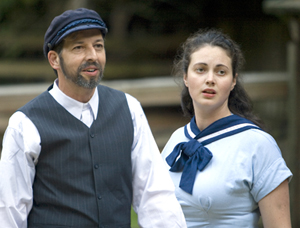Letters from Lithuania: The Horrors of War, the Triumph of Family

Letters from Lithuania is a site-specific work so complete in the use of its environment, so capable of immersing the audience into a different time and space that you will practically walk out of the show speaking Lithuanian.
OK maybe that’s a bit much, but in our little hamlet of Vancouver, I easily forget that site-specific theatre can be created for reasons other than our severe lack of theatre space (Click here for an update on the dangers of producing site-specific theatre for Mortal Coil).
Letters from Lithuania takes place at the Miniature Train in Stanley Park, which is fully transformed into a small village in Eastern Europe, complete with roaming goats and bails of hay. The year is 1929 – men wear vests, women wear aprons, and you have to ask your father before going on a date with the nice fellow from down the street.
…You get the idea.
From there the audience is split into two factions – a red stamp allows you to continue the journey in Lithuania, a blue stamp takes you on the train to South Africa. The rest of the show is actually two completely separate pieces, connected only by occasionally referenced letters sent between the son, Lazarus (Allan Zinyk) and his sister Sara (Emma Slipp), living on either side of the world. A seamlessly integrated live performance by local Slavic ensemble Zeellia provides the soundtrack throughout.
Prior to the show, I was told by a fellow theatre patron that we would witness both sides of the story. When I realized mid-way through that I had been misled, I felt frustrated. What happened to the brother? What is going on over there? What am I missing out on? It certainly served its purpose in reminding me that families separated by war throughout history have asked similar questions.
Nevertheless, my thoughts regarding this dual narrative waver. Does it allow the audience to fully experience the reality of that historic time, or did creator Bessie Wapp simply have too much material to adequately fit into one play? Currently, I’m leaning towards the former, but then again, I feel like I lucked out by being part of the Lithuanian side of the story, which incorporated most of the site-specific elements.
On the Lithuanian side, the audience is there with the characters – being chased by Nazis and Soviets, hiding out in the woods, trying to survive. The site-specificity enables a whole other realm of historic authenticity to the piece. As you can imagine, witnessing a story about World War Two while being led on a train is incredibly powerful, and at times left me shuddering.
Which is why the puppets didn’t really work for me.
Mid-way through the play, you see, the entire family suddenly, inexplicably, changes to puppet form. Later on they return to their human form, with puppetry sprinkled lightly throughout the rest of the show. What prompts this sudden change is unclear to me, and I’m not sure what the creators were trying to accomplish by including it. It could be that they wanted to lessen the blow of some of the more gruesome parts of the narrative. From an audience standpoint, however, it seems a superfluous accessory to what is overall an incredible story that does not need much embellishment. It also has the unfortunate side effect of removing the audience from the experience despite throwing us in the middle of the action. That being said, the play excellently incorporates stilt-walking and masks to represent the German and Soviet actions of the era, which is perhaps better suited to the Mortal Coil crew.
Despite my apprehensions about the puppetry, the overall concept of Letters from Lithuania is grand and well executed. Most of all, this is a terrific story that is well told and incredibly engaging. Mortal Coil has obviously taken a lot of time to develop this exciting idea, and thought of every angle to pursue to make it a theatrical experience that is not to be missed.
Letters from Lithuania runs until August 31 at the Miniature Train in Stanley Park. Produced by Mortal Coil. Written By Nicola Harwood; Original Concept and Development by Bessie Wapp; Directed by Peter Hall and Joanna Garfinkel; Puppets Designed and built by Tamara Unroe and Frank Rader; Lighting Designed by Jeff Harrison
Performers: Sharon Bayly; Susan Bertoia; Lisa Bunting; Kevin Knudsen; Sebastian Kroon; Josue Laboucane; Sara May Redmond; Emma Slipp; Ari Solomon; Brahm Taylor; Jonathan Teague; Bessie Wapp; Erin Wells; Alec Willows; Allan Zinyk
Musicians: Annie Brown; Beverly Dobrinsky; Alison Jenkins; Russell Sholberg



